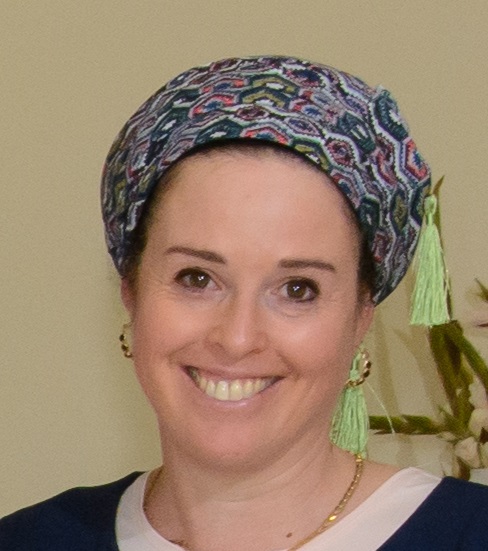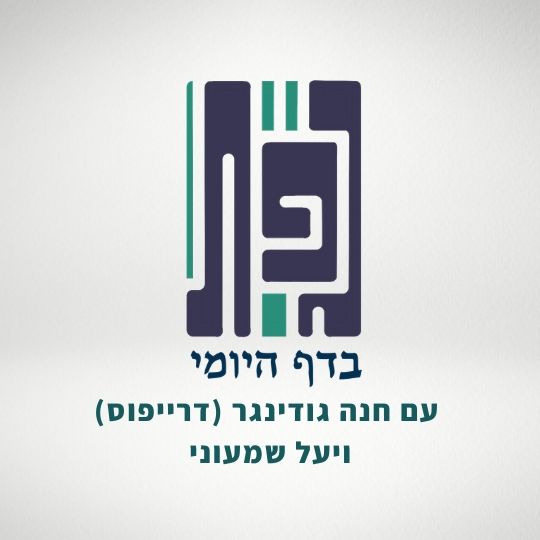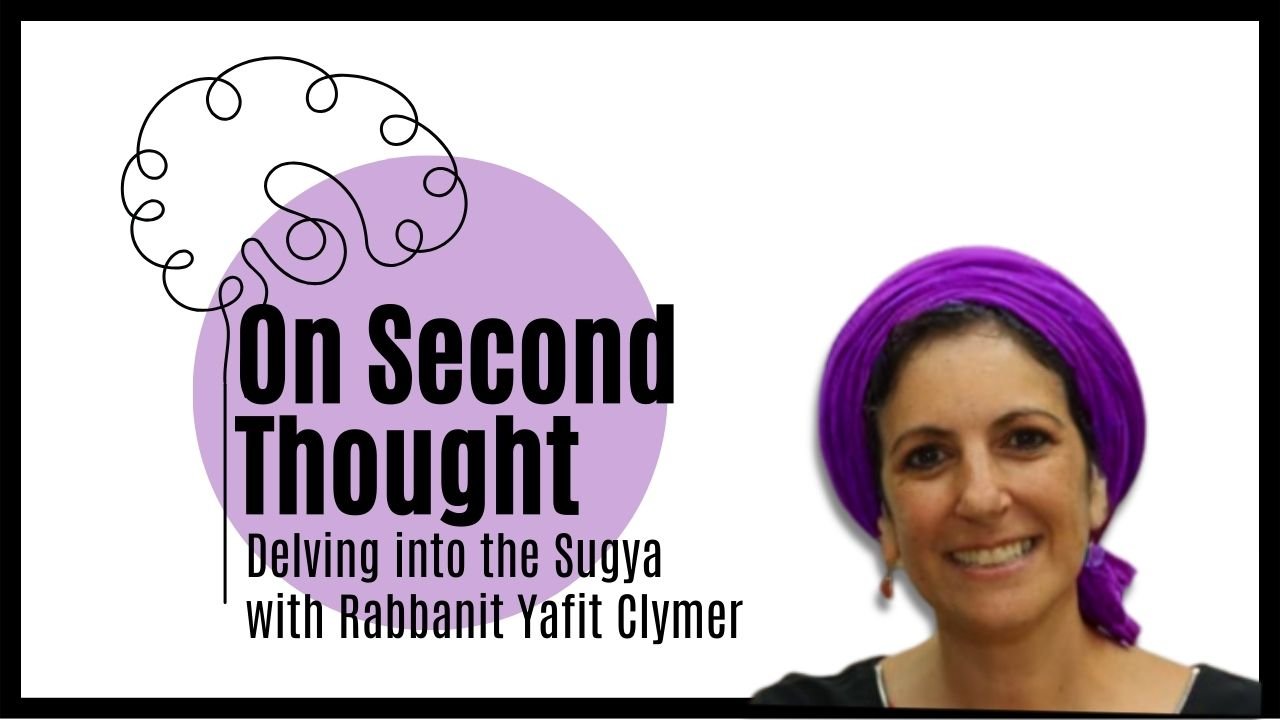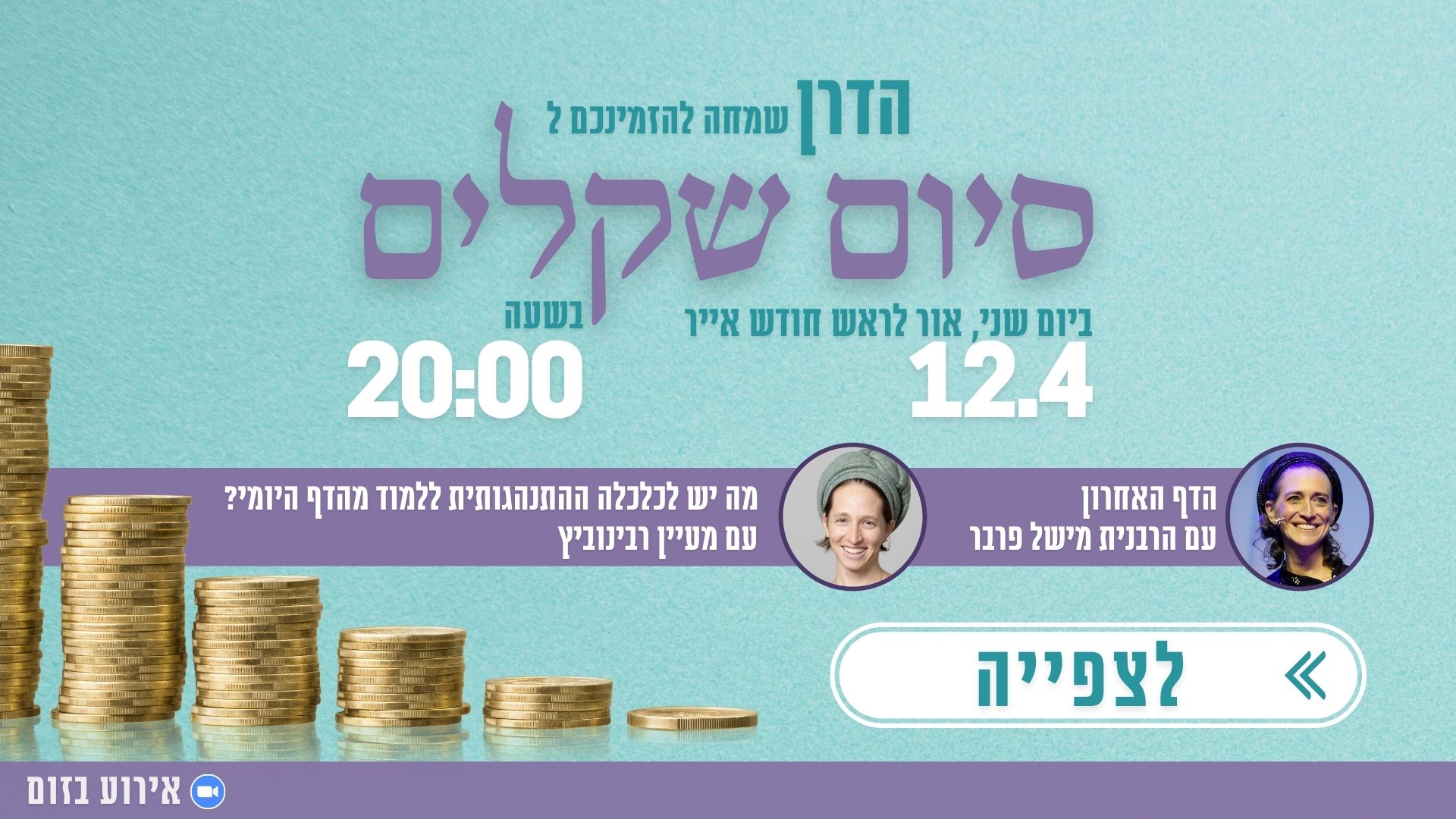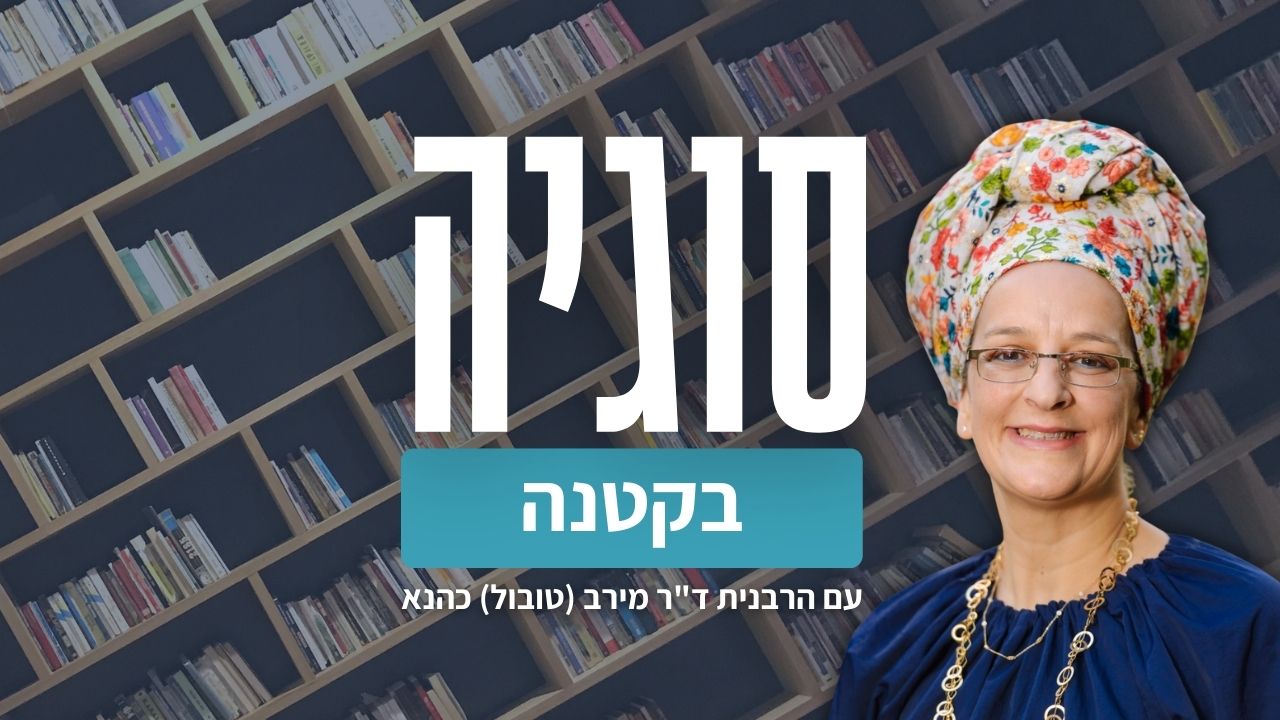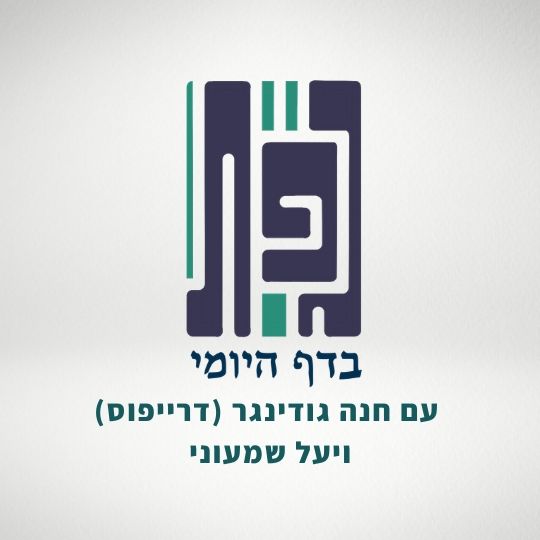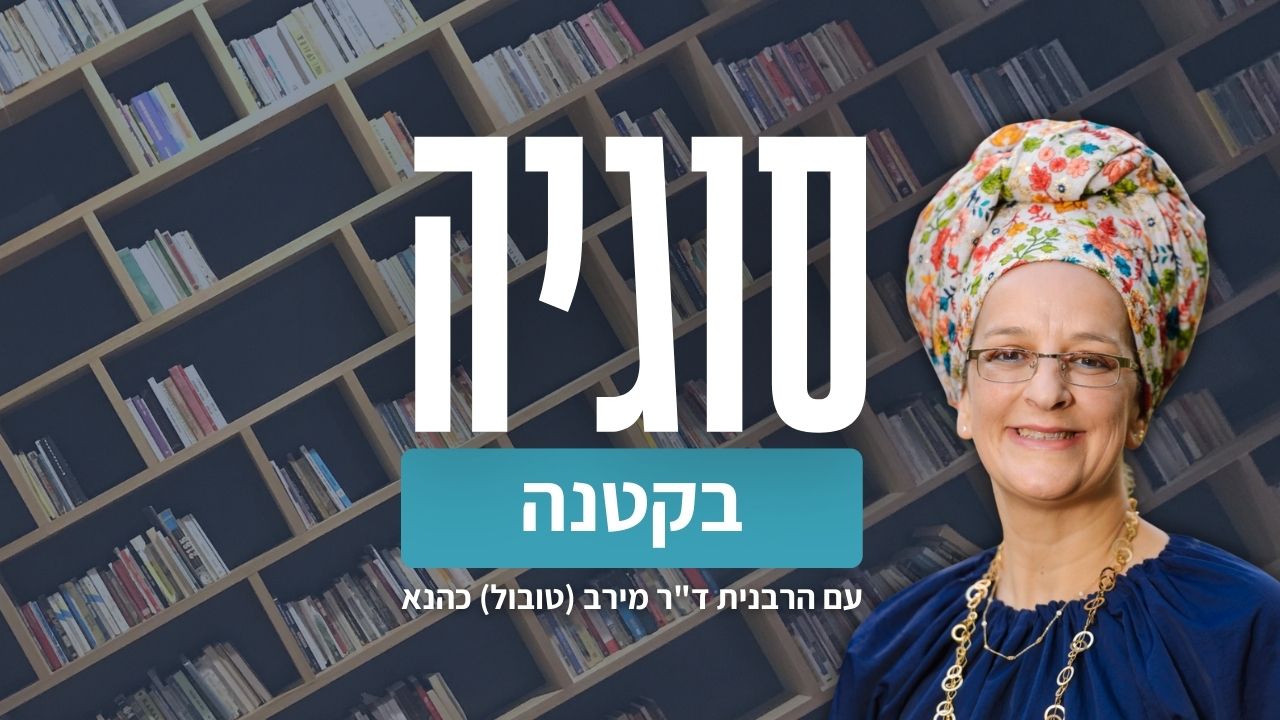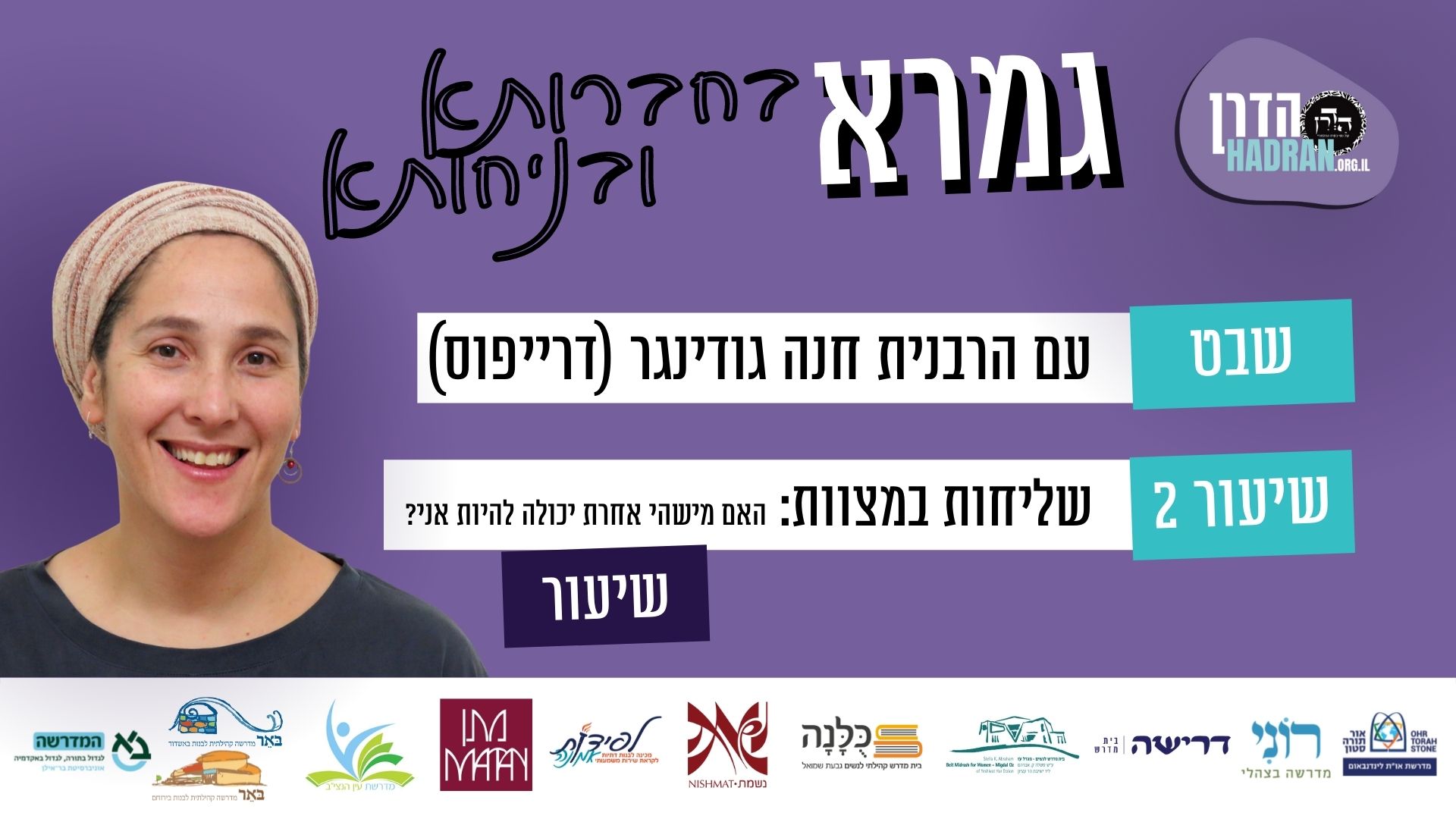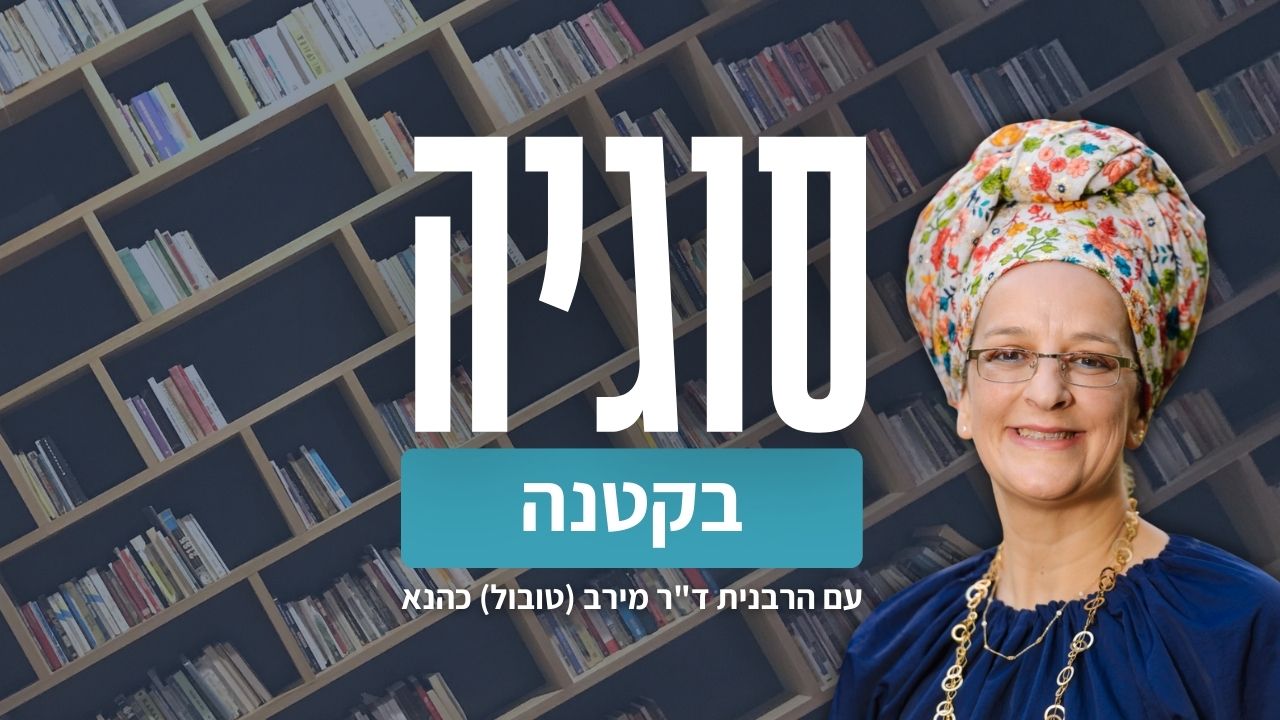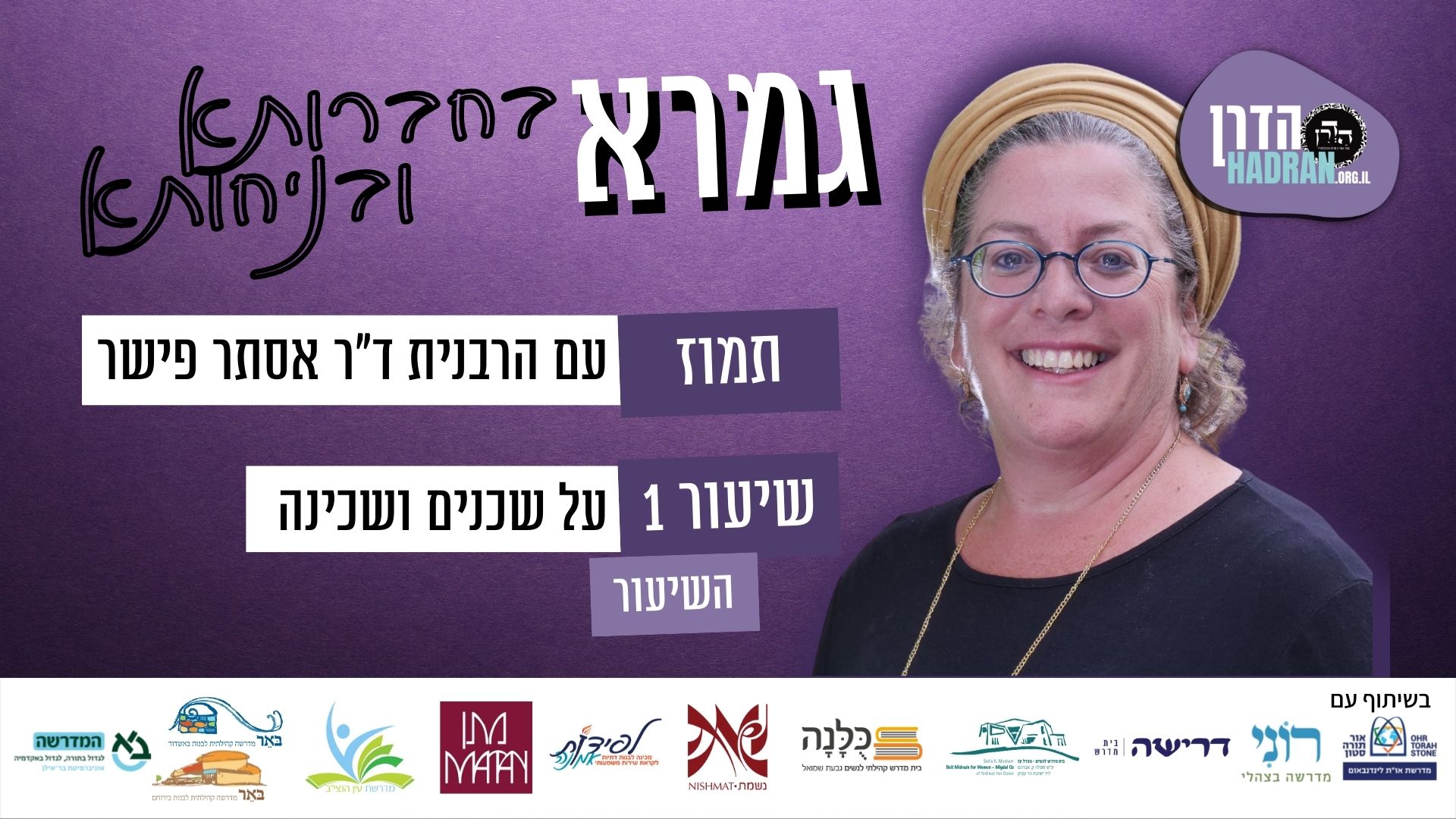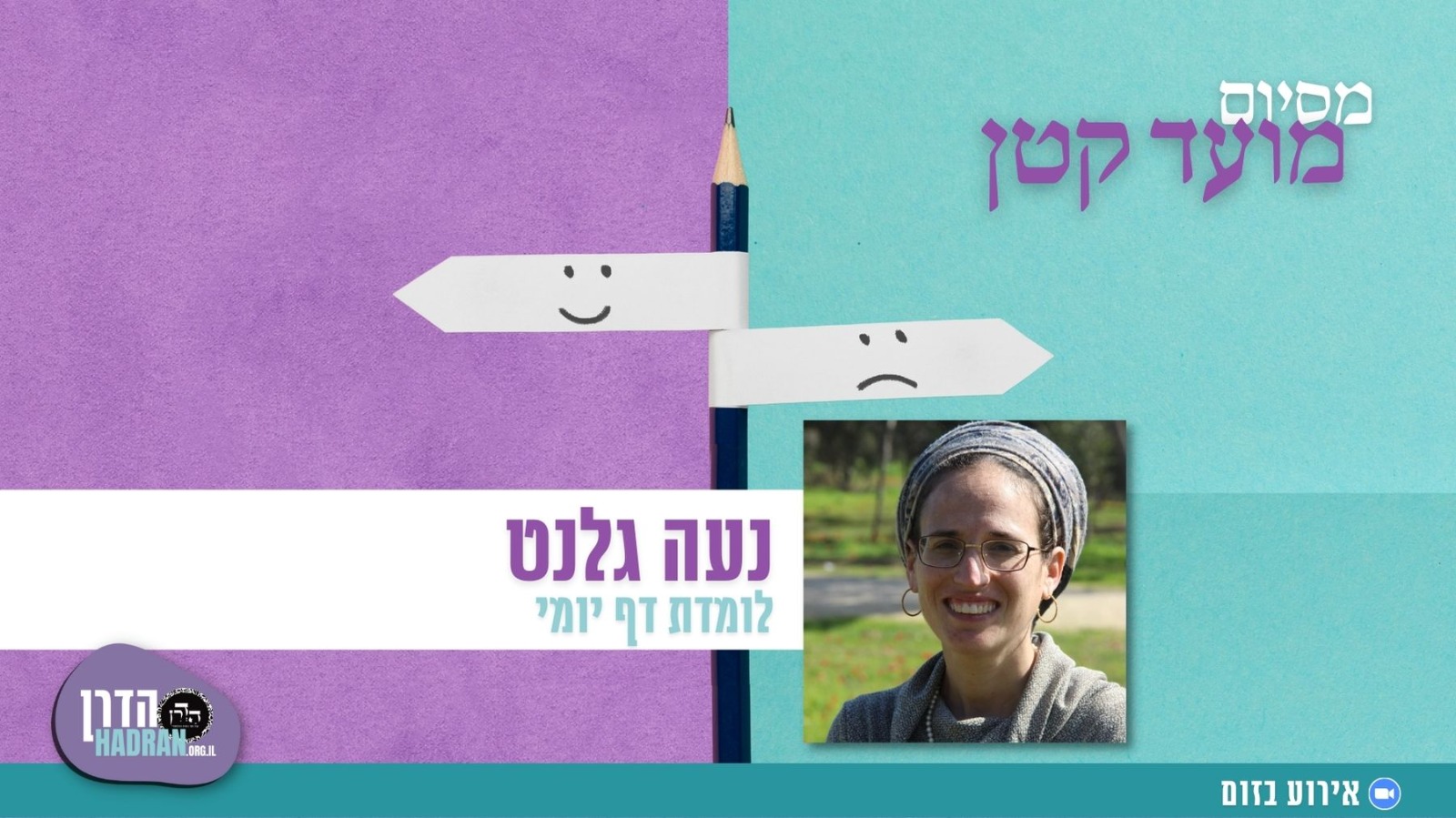מה השווי המינימלי שאפשר לפדות פטר חמור? איך דומה/שונה פטר חמור מהקדש? האם מירוח של עובד כוכבים פוטר מתרומות ומעשרות? אם מפקידים פירות אצל עם הארץ כותי או עובד כוכבים, האם צריך לדאוג לכך שהחליפו הפירות עם הפירות שלהם? אם כן, מה עליו לעשות?

כלים
הלימוד החודש מוקדש לרפואת פיליס הכט, גיטל פעשא בת מאשה רחל על ידי חברותיה הרבות שאוהבות ומעריכות אותה.
כלים
העמקה
רוצה להבין מה באמת קורה מתחת לפני השטח של הסוגיה?
שיעורים, פודקאסטים והרחבות של מיטב המורות שלנו יפתחו לך עוד זוויות וכיווני חשיבה.
חדשה בלימוד הגמרא?
זה הדף הראשון שלך? איזו התרגשות עצומה! יש לנו בדיוק את התכנים והכלים שיעזרו לך לעשות את הצעדים הראשונים ללמידה בקצב וברמה שלך, כך תוכלי להרגיש בנוח גם בתוך הסוגיות המורכבות ומאתגרות.
פסיפס הלומדות שלנו
גלי את קהילת הלומדות שלנו, מגוון נשים, רקעים וסיפורים. כולן חלק מתנועה ומסע מרגש ועוצמתי.
בכורות יא
בְּהֶשֵּׂג יָד כְּתִיב.
is written with regard to affordability, i.e., a case where one vows to give the valuation of an individual to the Temple but does not have sufficient funds to fulfill his vow. In such a case, he must pay at least a shekel. It does not apply to other matters.
אָמַר רַב נַחְמָן: הֲלָכָה כְּדִבְרֵי חֲכָמִים, וְכַמָּה? אָמַר רַב יוֹסֵף: אֲפִילּוּ פַּטְרוֹזָא בַּר דַּנְקָא, אָמַר רָבָא: אַף אֲנַן נָמֵי תְּנֵינָא גָּדוֹל וְקָטָן.
Rav Naḥman says: The halakha is in accordance with the statement of the Rabbis that one may redeem a firstborn donkey with a lamb that is worth even less than a shekel. And how much must the lamb be worth? Rav Yosef says: Even a lean lamb [patruza] that is worth only a ma’a [danka] may be used. Rava says: We learn in the mishna (9a) as well that the owner may give either a big or a small lamb, which supports Rav Yosef’s ruling.
פְּשִׁיטָא! מַהוּ דְּתֵימָא כּוּלֵּי הַאי לָא? אִי נָמֵי, פַּטְרוֹזָא לָא? קָא מַשְׁמַע לַן.
The Gemara asks: Isn’t it obvious that even a lean lamb worth one ma’a may be used? The baraita states that the lamb may be worth any amount. The Gemara answers: Lest you say that if the lamb is of such little value one may not redeem with it, Rav Yosef states that one may redeem with it. Alternatively, it could be claimed that a lean lamb may not be used for redemption due to its physical state. Therefore, Rav Yosef teaches us that one may redeem a firstborn donkey even with such a lamb.
רַבִּי יְהוּדָה נְשִׂיאָה הֲוָה לֵיהּ פֶּטֶר חֲמוֹר, שַׁדְּרֵיהּ לְקַמֵּיהּ דְּרַבִּי טַרְפוֹן, אֲמַר לֵיהּ: כַּמָּה בָּעֵינָא לְמִיתַּב לְכֹהֵן? אֲמַר לֵיהּ: הֲרֵי אָמְרוּ: עַיִן יָפָה בְּסֶלַע, עַיִן רָעָה בְּשֶׁקֶל, בֵּינוֹנִית בְּרִגְיָא.
Rabbi Yehuda Nesia had a firstborn donkey. He sent it before Rabbi Tarfon, and said to him: How much do I need to give a priest for its redemption, i.e., how much must the lamb used for its redemption be worth? Rabbi Tarfon said to him: Didn’t the Sages say: One who has a generous disposition redeems his firstborn donkey with a lamb worth a sela, one who has a miserly disposition redeems his donkey with a lamb worth a shekel, and one who has an intermediate disposition redeems his donkey with a lamb worth a ragya?
אָמַר רָבָא: הִלְכְתָא בְּרִגְיָא. וְכַמָּה? תְּלָתָא זוּזֵי. רְגִיל הָכָא וְרָגִיל הָכָא.
Rava said: The halakha is that one must redeem the firstborn donkey with a lamb that is worth at least a ragya. The Gemara asks: And how much is the value of a ragya? The Gemara answers: A ragya is worth three dinars, and is called a ragya because it is close to [ragil] here and close to there, i.e., its value is between that of a sela, which is worth fours dinars, and a shekel, which is worth two dinars.
קַשְׁיָא הִלְכְתָא אַהִלְכְתָא! לָא קַשְׁיָא, כָּאן — בְּבָא לִימָּלֵךְ, כָּאן — בְּעוֹשֶׂה מֵעַצְמוֹ.
The Gemara comments: The contradiction between this halakha, that one must give a lamb worth three dinars, and the halakha stated by Rav Naḥman, that one may give a lamb of any monetary value, poses a difficulty. The Gemara responds: That is not difficult, as here the reference is to one who comes to consult; he is told to give a lamb worth three dinars. There, the reference is to one who acts on his own, i.e., one who redeems his donkey without consultation, in which case he has fulfilled his obligation even if the lamb is worth only a ma’a.
אָמַר רַבִּי יִצְחָק אָמַר רֵישׁ לָקִישׁ: מִי שֶׁיֵּשׁ לוֹ פֶּטֶר חֲמוֹר וְאֵין לוֹ שֶׂה לִפְדּוֹתוֹ — פּוֹדֵהוּ בְּשׇׁוְיוֹ. לְמַאן? אִילֵימָא לְרַבִּי יְהוּדָה — הָא אָמַר: הִקְפִּידָה עָלָיו תּוֹרָה בְּשֶׂה! אֶלָּא לְרַבִּי שִׁמְעוֹן.
§ Rabbi Yitzḥak says that Reish Lakish says: One who has a firstborn donkey but does not have a lamb with which to redeem it may redeem the donkey with a sum of money equal to the donkey’s value and give it to a priest. The Gemara asks: In accordance with whose opinion is this statement? If we say that it is in accordance with the opinion of Rabbi Yehuda, doesn’t he say that the Torah is particular that the donkey be redeemed with a lamb (see 9a)? Rather, clearly it is in accordance with the opinion of Rabbi Shimon.
רַב אַחָא מַתְנִי הָכִי, רָבִינָא קַשְׁיָא לֵיהּ: רַבִּי יְהוּדָה וְרַבִּי שִׁמְעוֹן — הֲלָכָה כְּרַבִּי יְהוּדָה!
The Gemara comments: Rav Aḥa teaches it in this way, that the statement of Reish Lakish was made in accordance with the opinion of Rabbi Shimon. Ravina found this difficult, as wherever there is a dispute between Rabbi Yehuda and Rabbi Shimon, the halakha is in accordance with the opinion of Rabbi Yehuda.
וּסְתַם לַן תַּנָּא כְּרַבִּי יְהוּדָה, וְאַתְּ אָמְרַתְּ הֲלָכָה כְּרַבִּי שִׁמְעוֹן?!
And furthermore, the tanna taught us an unattributed mishna in accordance with the opinion of Rabbi Yehuda. The mishna on 9a states that in a case where the firstborn status of a donkey is uncertain, the owner must redeem it with a lamb to abrogate its forbidden status, and he may then keep the lamb. The Gemara on 9b explains that this is in accordance with the opinion of Rabbi Yehuda that a firstborn donkey is forbidden before its redemption. And you say that Reish Lakish rules that the halakha is in accordance with the opinion of Rabbi Shimon?
אֶלָּא, אֲפִילּוּ תֵּימָא רַבִּי יְהוּדָה, לֹא יְהֵא חָמוּר מִן הַהֶקְדֵּשׁ, וְלֹא אָמְרָה תּוֹרָה ״בְּשֶׂה״ לְהַחְמִיר עָלָיו אֶלָּא לְהָקֵל עָלָיו. רַב נַחְמָן בְּרֵיהּ דְּרַב יוֹסֵף פָּרֵיק לֵיהּ בְּשִׁילְקֵי בְּשׇׁוְיוֹ.
Ravina concludes: Rather, the statement of Reish Lakish is correct even if you say that the halakha is in accordance with the opinion of Rabbi Yehuda, as the halakha of a firstborn donkey should not be more stringent than that of consecrated items. One who redeems a consecrated animal from its consecrated status redeems it with any movable property that is worth its value. And the Torah did not state that one must redeem a firstborn donkey with a lamb in order to be stringent with the owner, but in order to be lenient with the owner such that he is not obligated to redeem it at its value, as a lamb is worth less than a donkey. The Gemara relates that Rav Naḥman, son of Rav Yosef, redeemed a firstborn donkey with boiled vegetables that were worth its value.
אָמַר רַב שֵׁיזְבִי אָמַר רַב הוּנָא: הַפּוֹדֶה פֶּטֶר חֲמוֹר שֶׁל חֲבֵירוֹ, פִּדְיוֹנוֹ פָּדוּי. אִיבַּעְיָא לְהוּ: פִּדְיוֹנוֹ לַפּוֹדֶה, אוֹ דִלְמָא פִּדְיוֹנוֹ לַבְּעָלִים?
§ Rav Sheizevi says that Rav Huna says: In the case of one who redeems the firstborn donkey of another, his object of redemption, i.e., the firstborn donkey, is redeemed, despite the fact that the owner did not redeem it. A dilemma was raised before the Sages: Does his object of redemption belong to the one who redeems it, or perhaps his object of redemption belongs to the owner?
אַלִּיבָּא דְּרַבִּי שִׁמְעוֹן לָא תִּיבְּעֵי לָךְ, כֵּיוָן דְּאָמַר מוּתָּר בַּהֲנָאָה — מָמוֹנָא דִבְעָלִים הוּא, כִּי תִּיבְּעֵי אַלִּיבָּא דְּרַבִּי יְהוּדָה, דְּאָמַר אָסוּר בַּהֲנָאָה.
The Gemara clarifies: According to the opinion of Rabbi Shimon you should not raise the dilemma, since he says that prior to the redemption it is permitted for the owner to derive benefit from the firstborn donkey by using it for labor or renting it out. Therefore, it is the property of the owner, and giving a lamb to the priest does not change this status. When you raise the dilemma, it should be according to the opinion of Rabbi Yehuda, who says that it is prohibited to derive benefit from the firstborn donkey prior to its redemption. If so, it does not belong to the owner initially, and only redeeming the donkey with the lamb allows him to take possession of it.
לְהֶקְדֵּשׁ מְדַמֵּי לֵיהּ, וְרַחֲמָנָא אָמַר: ״וְנָתַן הַכֶּסֶף וְקָם לוֹ״, אוֹ דִלְמָא, כֵּיוָן דְּקָנֵי לְהוּ בְּבֵינֵי וּבֵינֵי, לָא דָּמֵי לְהֶקְדֵּשׁ?
Consequently, one can ask whether the firstborn donkey is compared to consecrated property; and the Merciful One says with regard to redeeming consecrated property: “And he will give the money and it will be assured to him” (see Leviticus 27:19), which indicates that the one who gives the redemption money acquires the item even if he did not consecrate it initially. Or perhaps since the owner may redeem the firstborn donkey with a lamb that is worth less than the donkey, he owns the difference between the price of the donkey and the price of the lamb, and therefore it is not similar to consecrated property, where the one who consecrated it does not retain any ownership of the item.
אָמַר רַב נַחְמָן, תָּא שְׁמַע: הַגּוֹנֵב פֶּטֶר חֲמוֹר שֶׁל חֲבֵירוֹ — מְשַׁלֵּם תַּשְׁלוּמֵי כֶפֶל לַבְּעָלִים, וְאַף עַל פִּי שֶׁאֵין לוֹ עַכְשָׁיו — יֵשׁ לוֹ לְאַחַר מִכָּאן.
Rav Naḥman said: Come and hear a resolution from a baraita: In the case of one who steals the firstborn donkey of another before it is redeemed and he is then caught, he pays the payment of double the principal to the owner (see Exodus 22:3). And even though the owner does not have rights to the donkey now, he does have rights to it afterward, i.e., after the redemption.
מַנִּי? אִילֵימָא רַבִּי שִׁמְעוֹן, אַמַּאי אֵין לוֹ עַכְשָׁיו? אֶלָּא פְּשִׁיטָא רַבִּי יְהוּדָה.
The Gemara analyzes the baraita: Whose opinion does this follow? If we say that it is in accordance with the opinion of Rabbi Shimon, why does the owner not have rights to it now? Rabbi Shimon holds that it is permitted to derive benefit from a firstborn donkey even before its redemption. Rather, it is obvious that it is in accordance with the opinion of Rabbi Yehuda, who deems it prohibited to derive benefit from a firstborn donkey prior to its redemption.
וְאִי סָלְקָא דַעְתָּךְ לְהֶקְדֵּשׁ מְדַמֵּינַן לֵיהּ, ״וְגֻנַּב מִבֵּית הָאִישׁ״ אָמַר רַחֲמָנָא, וְלֹא מִבֵּית הֶקְדֵּשׁ! וְתוּ לָא מִידֵּי.
And if it enters your mind that we compare it to consecrated property, then why must the thief pay double the principal? Doesn’t the Merciful One state with regard to the double payment of a thief: “And it be stolen from the man’s house” (Exodus 22:6), indicating: But not when it is stolen from the Temple treasury? In such a case the thief does not pay double. Evidently, a firstborn donkey does not have the status of consecrated property, and if another person redeemed it, it still belongs to the owner. The Gemara concludes: And nothing more remains to be said about this issue, as this is a clear proof.
אַחַת בִּיכְּרָה וְאַחַת שֶׁלֹּא בִּיכְּרָה [כּוּ׳]. תָּנוּ רַבָּנַן: כֵּיצַד אָמְרוּ נִכְנַס לְדִיר לְהִתְעַשֵּׂר?
§ The mishna states that if a person owned two donkeys, and one had previously given birth and one had not previously given birth, and they gave birth to a male and a female, and it is not clear which donkey gave birth to the male and which to the female, he designates one lamb as redemption due to the uncertainty, as perhaps the one that had not previously given birth was the one that gave birth to the male. The mishna also states that this lamb is tithed with the other non-sacred animals. With regard to this point, the Gemara states that the Sages taught in a baraita: In what case did the Sages say that this lamb enters the pen in order to be tithed?
אִי אַתָּה יָכוֹל לוֹמַר בְּבָא לְיַד כֹּהֵן, שֶׁהֲרֵי שָׁנִינוּ: הַלָּקוּחַ וְשֶׁנִּיתַּן לוֹ בְּמַתָּנָה פָּטוּר מִמַּעְשַׂר בְּהֵמָה, אֶלָּא בְּיִשְׂרָאֵל שֶׁהָיוּ לוֹ עֲשָׂרָה סְפֵק פִּטְרֵי חֲמוֹרִים בְּתוֹךְ בֵּיתוֹ, שֶׁמַּפְרִישׁ עֲלֵיהֶן עֲשָׂרָה שֵׂיִין, וּמְעַשְּׂרָן, וְהֵן שֶׁלּוֹ.
You cannot say that this is referring to a case where the lamb had already entered the possession of a priest, as we learned in a mishna (55b): An animal that was purchased by a person or that was given to him as a present is exempt from animal tithe, and this lamb was given as a present to the priest. Rather, it is referring to an Israelite who has ten donkeys in his house whose firstborn status is uncertain, who designates ten lambs for them in order to redeem them due to the uncertainty, and he tithes those lambs as well, and they are his.
מְסַיַּיע לֵיהּ לְרַב נַחְמָן, דְּאָמַר רַב נַחְמָן אָמַר רַבָּה בַּר אֲבוּהּ: יִשְׂרָאֵל שֶׁהָיוּ לוֹ עֲשָׂרָה סְפֵק פִּטְרֵי חֲמוֹרִים — מַפְרִישׁ עֲלֵיהֶן עֲשָׂרָה שֵׂיִין, וּמְעַשְּׂרָן, וְהֵן שֶׁלּוֹ.
The Gemara comments that this baraita supports the statement of Rav Naḥman, as Rav Naḥman says that Rabba bar Avuh says: An Israelite who has in his house ten donkeys whose firstborn status is uncertain designates ten lambs to redeem them, and tithes the lambs, separating one as a tithe, and they all belong to him, as a priest cannot prove that he is entitled to any of the ten.
וְאָמַר רַב נַחְמָן אָמַר רַבָּה בַּר אֲבוּהּ: יִשְׂרָאֵל שֶׁהָיוּ לוֹ עֲשָׂרָה פִּטְרֵי חֲמוֹרִים וַדָּאִין בְּתוֹךְ בֵּיתוֹ, שֶׁנָּפְלוּ מִבֵּית אֲבִי אִמּוֹ כֹּהֵן, וְאוֹתוֹ אֲבִי אִמּוֹ כֹּהֵן נָפְלוּ לוֹ מִבֵּית אֲבִי אִמּוֹ יִשְׂרָאֵל.
And in addition, Rav Naḥman says that Rabba bar Avuh says: In the case of an Israelite who has ten certain firstborn donkeys in his house that were bequeathed to him from the household of his mother’s father, who was a priest and was therefore exempt from the redemption of firstborn donkeys, but that mother’s father who was a priest had the donkeys bequeathed to him from the household of his mother’s father, who was an Israelite, the donkeys initially required redemption, and the priest should have redeemed them with lambs, though it was permitted for him to keep the lambs for himself.
מַפְרִישׁ עֲלֵיהֶן עֲשָׂרָה שֵׂיִין, וּמְעַשְּׂרָן, וְהֵן שֶׁלּוֹ.
Therefore, his grandson, who inherits these donkeys and is an Israelite, designates ten lambs for them and tithes them and they are his, as if his grandfather had designated the lambs himself and bequeathed them to him.
וְאָמַר רַב נַחְמָן אָמַר רַבָּה בַּר אֲבוּהּ: יִשְׂרָאֵל שֶׁהָיוּ לוֹ טְבָלִים מְמוֹרָחִין בְּתוֹךְ בֵּיתוֹ, שֶׁנָּפְלוּ מִבֵּית אֲבִי אִמּוֹ כֹּהֵן, וְאוֹתוֹ אֲבִי אִמּוֹ כֹּהֵן נָפְלוּ לוֹ מִבֵּית אֲבִי אִמּוֹ יִשְׂרָאֵל — מְעַשְּׂרָן וְהֵן שֶׁלּוֹ.
And likewise, Rav Naḥman says that Rabba bar Avuh says: In the case of an Israelite who has smoothed piles of untithed produce in his house, from which one is obligated to separate teruma for the priests and tithes for the Levites, and it is produce that was bequeathed to him from the household of his mother’s father, who was a priest, and that mother’s father who was a priest previously had it bequeathed to him from the household of his mother’s father, who was an Israelite, he separates teruma and tithes from the produce and it is his, just as if his grandfather who was a priest had tithed the produce, acquired the tithe, and bequeathed it to him as an inheritance.
וּצְרִיכָא, דְּאִי אַשְׁמְעִינַן קַמַּיְיתָא — מִשּׁוּם דְּקָא מַפְרַישׁ וְקָאֵי.
The Gemara comments that both rulings of Rav Naḥman, i.e., the one concerning firstborn donkeys and the one concerning untithed produce, are necessary. Because had he taught us only the first case, i.e., that of the firstborn donkeys, one could claim that perhaps only in that case the Israelite grandson may keep the lambs; it is considered as if his grandfather who was a priest designated the lambs and acquired them because they stand separated. An act of separation would have been unnecessary, as the priest could have simply declared that his own lambs were serving to redeem the donkeys.
אֲבָל הָכָא — מַתָּנוֹת שֶׁלֹּא הוּרְמוּ כְּמִי שֶׁלֹּא הוּרְמוּ דָּמְיָין, אֵימָא לָא.
But here, with regard to the untithed produce, one must separate the teruma and declare it as such in order for the priest to acquire it. Therefore, perhaps gifts to which members of the priesthood are entitled that were not separated are treated as if they were not separated, even if they were already in the possession of a priest. If so, say that it is not considered as if his grandfather who was a priest acquired the teruma.
וְאִי אַשְׁמְועִינַן הָכָא — דְּאֶפְשָׁר לְעַשּׂוֹרֵי מִינֵּיהּ וּבֵיהּ, דְּהָא מַנַּח, אֲבָל הָתָם — כֵּיוָן דְּשֶׂה מֵעָלְמָא בָּעֵי אֵתוֹיֵי, וּמַפְרַישׁ וְקָאֵי, אֵימָא לָא, צְרִיכָא.
And had Rav Naḥman taught us only here, with regard to untithed produce, that it is treated as if his grandfather who was a priest separated the teruma and acquired it, one might claim that this is only because it is possible to tithe the produce from itself, as both the untithed produce and the teruma that will be separated from it lie together. But there, with regard to a firstborn donkey, since one needs to bring a lamb from elsewhere to redeem it, say that the principle that the lamb stands separated and does not require additional separation is not applied. Therefore, it is necessary for both cases to be stated.
אָמַר רַבִּי שְׁמוּאֵל בַּר נָתָן אָמַר רַבִּי חֲנִינָא: הַלּוֹקֵחַ טְבָלִים
§ The Gemara discusses a variation of the previous case. Rabbi Shmuel bar Natan says that Rabbi Ḥanina says: With regard to one who purchases untithed produce
מְמוֹרָחִין מִן הַגּוֹי, מְעַשְּׂרָן וְהֵן שֶׁלּוֹ.
that is gathered in smoothed piles, from a gentile, he tithes the piles but they are his, as he is not required to give the teruma to a priest or the tithes to a Levite.
דְּמָרְחִינְהוּ מַאן? אִילֵימָא דְּמָרְחִינְהוּ גּוֹי — ״דְּגָנְךָ״ אָמַר רַחֲמָנָא, וְלֹא דְּגַן גּוֹי!
The Gemara asks: Who smoothed the piles? If we say that a gentile smoothed them, doesn’t the Merciful One state: “Your grain” (Deuteronomy 12:17, 18:4), with regard to teruma and tithes, indicating that only grain whose processing is completed by a Jew is subject to the rules of teruma and tithes, but not the grain of a gentile?
אֶלָּא דְּמָרְחִינְהוּ יִשְׂרָאֵל מֵרְשׁוּת גּוֹי. מְעַשְּׂרָן, דְּאֵין קִנְיָן לְגוֹי בְּאֶרֶץ יִשְׂרָאֵל לְהַפְקִיעַ מִיַּד מַעֲשֵׂר, וְהֵן שֶׁלּוֹ — דְּאָמַר לֵיהּ: קָאָתֵינָא מִכֹּחַ גַּבְרָא דְּלָא מָצֵית (אִישְׁתַּעֵית) [אִישְׁתַּעוֹיֵי] דִּינָא בַּהֲדֵיהּ.
Rather, clearly a Jew smoothed them while they were in the possession of the gentile before purchasing them. Therefore, he tithes them, as a gentile has no capability of acquisition of land in Eretz Yisrael that would cause the abrogation of the sanctity of the land, thereby removing it from the obligation to tithe its produce. But the tithes are still the Jew’s, as he says to the priest: I have come to own this produce on the basis of the rights of a man with whom you cannot engage in litigation, i.e., a gentile, from whom I bought the produce. Since he is not obligated to give teruma or tithes to the priest, I am not required to give them either.
תְּנַן הָתָם: הַמַּפְקִיד פֵּירוֹתָיו אֵצֶל הַכּוּתִי וְאֵצֶל עַם הָאָרֶץ, בְּחֶזְקָתָן לַמַּעֲשֵׂר וְלַשְּׁבִיעִית.
§ The Gemara cites an additional discussion involving this issue: We learned in a mishna elsewhere (Demai 3:4) that with regard to one who deposits his produce with a Samaritan or with one who is unreliable with regard to tithes [am ha’aretz], when they return it to him, the produce retains its presumptive status with regard to the halakhot of tithe and produce of the Sabbatical Year, both of which must be removed from one’s property. The Samaritan or am ha’aretz is not suspected of having exchanged the deposited produce with untithed produce or produce of the Sabbatical Year.
אֵצֶל הַגּוֹי — כְּפֵירוֹתָיו, רַבִּי שִׁמְעוֹן אוֹמֵר: דְּמַאי.
But in the case of one who deposits his produce with a gentile, the produce returned to him is treated as the produce of the gentile, as he presumably exchanged it with his own. Rabbi Shimon says: It is treated as doubtfully tithed produce [demai], as it is uncertain whether the gentile exchanged the produce or not.
אָמַר רַבִּי אֶלְעָזָר: לְהַפְרִישׁ — כּוּלֵּי עָלְמָא לָא פְּלִיגִי, כִּי פְּלִיגִי — לִיתְּנָן לְכֹהֵן. תַּנָּא קַמָּא סָבַר: וַדַּאי חַלְּפִינְהוּ, וּבָעֵי מִיתְּנַנְהוּ לְכֹהֵן, וְרַבִּי שִׁמְעוֹן סָבַר: דְּמַאי.
The mishna continues: Rabbi Elazar says: Everyone agrees that one is obligated to separate teruma and tithes from the produce that the gentile returned to him. When they disagree it is with regard to giving it to the priest following the separation. The first tanna holds that the gentile certainly exchanged the produce, and therefore the owner needs to give the teruma to the priest. And Rabbi Shimon holds that the produce is treated as demai, so in order to receive teruma, the priest must bring proof that the produce requires tithing.
יָתֵיב רַב דִּימִי וְקָאָמַר לְהָא שְׁמַעְתָּא, אֲמַר לֵיהּ אַבָּיֵי: טַעְמָא דִּמְסַפְּקָא לַן אִי חַלְּפִינְהוּ אִי לָא חַלְּפִינְהוּ, הָא וַדַּאי חַלְּפִינְהוּ — דְּכוּלֵּי עָלְמָא בָּעֵי לְמִיתְּבִינְהוּ לְכֹהֵן, וְהָאָמַר רַבִּי שְׁמוּאֵל אָמַר רַבִּי חֲנִינָא: הַלּוֹקֵחַ טְבָלִים מִן הַגּוֹי מְמוֹרָחִין — מְעַשְּׂרָן וְהֵן שֶׁלּוֹ!
Rav Dimi sat and stated this halakha of Rabbi Elazar. Abaye said to him: The reason that Rabbi Shimon disagrees is that we are uncertain whether the gentile exchanged it or whether he did not exchange it. But if he definitely exchanged it, everyone agrees that he is required to give the teruma and tithes to a priest. Why? But doesn’t Rabbi Shmuel say that Rabbi Ḥanina says: In the case of one who purchases untithed produce from a gentile that is gathered in smoothed piles, i.e., it was completely processed, he tithes and separates teruma from the piles of produce but they are his, and he is not required to give the teruma to a priest?
דִּלְמָא כָּאן בִּתְרוּמָה גְּדוֹלָה, כָּאן בִּתְרוּמַת מַעֲשֵׂר!
Rav Dimi said to him: Perhaps here, in the mishna that indicates that he must give the teruma to a priest, it is referring to teruma gedola, i.e., the teruma that is separated from the produce before tithes, whereas there, Rabbi Ḥanina’s statement that he separates tithes from them but they are his is referring to the teruma that is separated from the tithe.
אַזְכַּרְתַּן מִילְּתָא דְּאָמַר רַבִּי יְהוֹשֻׁעַ בֶּן לֵוִי: מִנַּיִן לַלּוֹקֵחַ טְבָלִים מְמוֹרָחִין מִן הַגּוֹי שֶׁהוּא פָּטוּר מִתְּרוּמַת מַעֲשֵׂר? שֶׁנֶּאֱמַר: ״וְאֶל הַלְוִיִּם תְּדַבֵּר וְאָמַרְתָּ אֲלֵיהֶם כִּי תִקְחוּ מֵאֵת בְּנֵי יִשְׂרָאֵל״, טְבָלִים שֶׁאַתָּה לוֹקֵחַ מִבְּנֵי יִשְׂרָאֵל — אַתָּה מַפְרִישׁ מֵהֶן תְּרוּמַת מַעֲשֵׂר וְנוֹתְנָהּ לַכֹּהֵן, טְבָלִים שֶׁאַתָּה לוֹקֵחַ מִן הַגּוֹי — אִי אַתָּה מַפְרִישׁ מֵהֶן תְּרוּמַת מַעֲשֵׂר וְנוֹתְנָהּ לַכֹּהֵן.
Abaye said to him: You reminded me of a statement that Rabbi Yehoshua ben Levi said: From where is it derived that one who purchases from a gentile untithed produce that is gathered in smoothed piles is exempt from separating the teruma of the tithe? It is derived from a verse, as it is stated: “And you shall speak to the Levites, and say to them: When you take the tithe from the children of Israel…then you shall set apart of it a gift for the Lord, even a tithe of the tithe” (Numbers 18:26). It can be inferred from here that concerning untithed produce that you purchase from the children of Israel, you separate teruma of the tithe from it and give the teruma of the tithe to a priest, but concerning untithed produce that you purchase from a gentile, you do not separate teruma of the tithe from it and give it to a priest.
וְאִם מֵת נֶהֱנִים בּוֹ. דְּמִית הֵיכָא? אִילֵּימָא דְּמִית בֵּי כֹהֵן, וְנֶהֱנֶה בּוֹ כֹּהֵן — פְּשִׁיטָא, מָמוֹנָא דִּידֵיהּ הוּא! אֶלָּא, דְּמִית בֵּי בְעָלִים וְנֶהֱנֶה בּוֹ כֹּהֵן — הָא נָמֵי פְּשִׁיטָא!
§ The mishna teaches with regard to the lamb that is used to redeem the firstborn donkey: And if it dies, one may derive benefit from it. The Gemara asks: Where did it die? If we say that it died in the house of the priest, and the mishna means that the priest may derive benefit from it, isn’t it obvious? The lamb is his property. Rather, perhaps the mishna means that it died in the house of the owner before it was given to the priest, and teaches that the priest may derive benefit from it. Isn’t this also obvious?
סָלְקָא דַעְתָּךְ אָמֵינָא, כֹּל כַּמָּה דְּלָא מְטָא לִידֵיהּ לָא זְכָה בֵּיהּ, קָא מַשְׁמַע לַן דְּמֵעִידָּנָא דְּאַפְרְשֵׁיהּ, בִּרְשׁוּתֵיהּ דְּכֹהֵן קָאֵי.
The Gemara responds: It might enter your mind to say that as long as the lamb has not reached the possession of the priest, the priest has not acquired it. Therefore, the mishna teaches us that from the time that the Israelite separated it, it stands in the possession of the priest.

